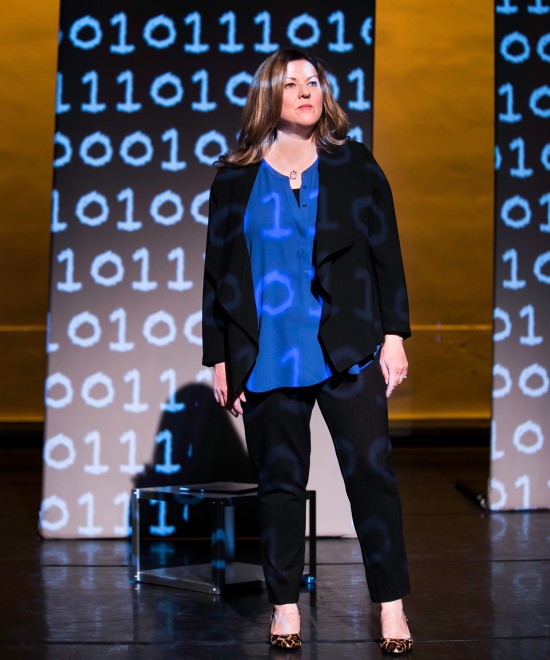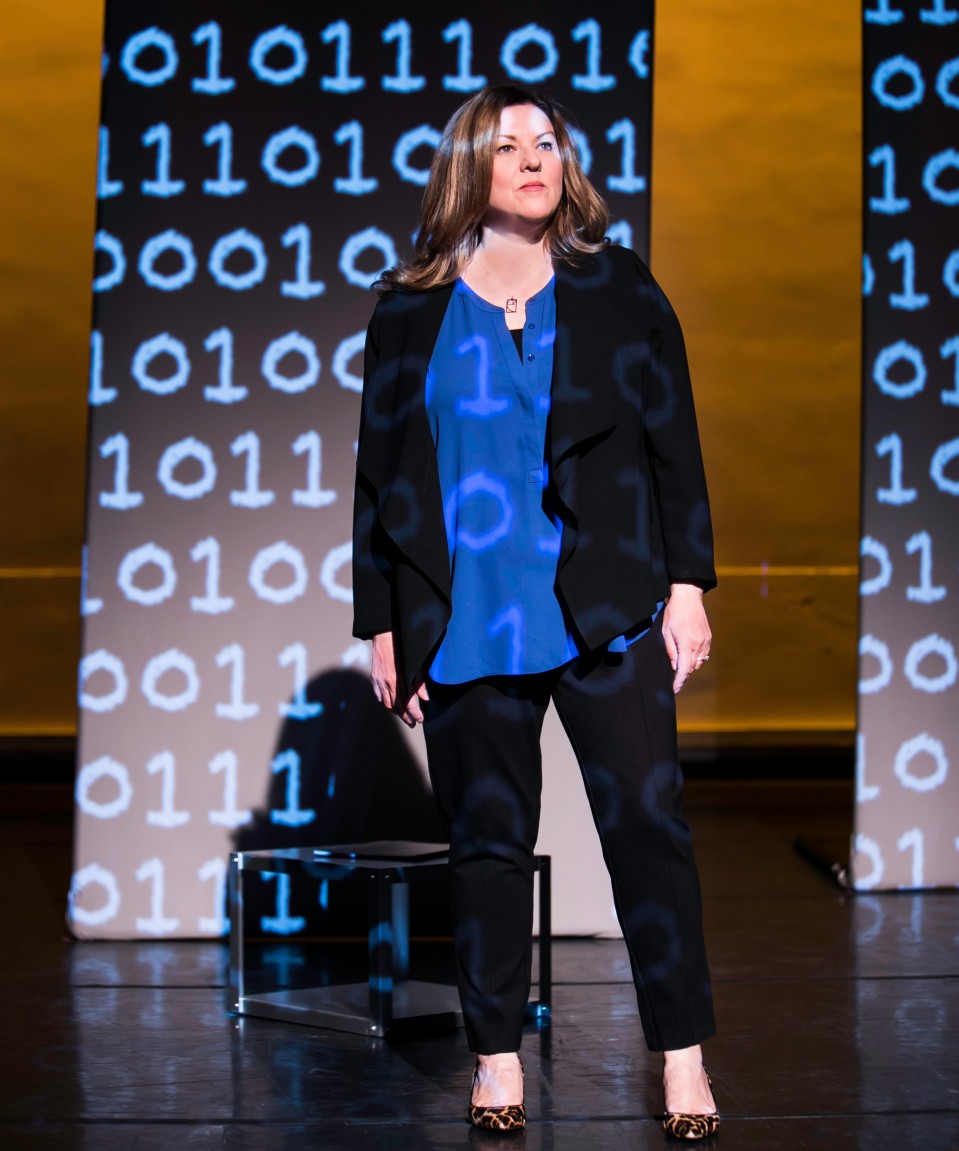Truth values
Years ago, I quit my PhD program. That became the subject of a play— and led me to launch a program to support women in STEM.



In the spring of 2011, I received an extraordinary invitation to perform my one-woman show at MIT as part of the Institute’s 150th anniversary celebration.
I walked into the Media Lab building (E14), new since my time at MIT, and took the elevator to the top floor with the dazzling view, where the Institute had created a theater space specifically for my play, Truth Values: One Girl’s Romp Through MIT’s Male Math Maze. I’d arrived early for my first rehearsal and had the room to myself. Seeing all the lighting equipment overhead, the black draperies, the stage, and the greenroom they’d built for me, I was overcome; I sank into a chair and wept. This was beyond anything I’d ever imagined would happen when, dispirited and isolated, I left my PhD program in 1989.
I’d been at the ABD (“all but dissertation”) level—actually, AB two-thirds D—when I packed up my small fortune of math textbooks and esoteric papers on reflexive nonbinary relations into a dozen or so boxes and loaded them into the moving truck. I promised myself I would leave academia entirely, and never speak about math or MIT again.
A few soul-searching years later, I found my way into the arts. I’d always been passionate about performing, making time for voice and acting lessons alongside my math studies, performing in shows whenever I could. But I just as passionately endeavored to convince myself these activities were purely avocational. Then one day, it dawned on me that the one common denominator of my life, to use a math term, was the arts. So I finally decided to take myself seriously as an artist.
After a decade happily spent giving life to other people’s words as an actor, singer, and producer, I decided to try my hand at writing my own. I got myself a journal—covered in Gerbera daisies, my favorite flower—and immediately filled it with poems and stories. Several not-one-page-left-empty journals later, the stories turned toward my life in math. I considered all this purely an exercise in learning how to write (write what you know!) until I realized, to my surprise, that I had an extensive collection of handwritten stories about studying math at MIT.
Then, one fateful day in the winter of 2006, I had to turn in something autobiographical for my writers’ workshop. I’d been too busy to write anything new, so in spite of my promise to myself, I dipped into my journals for some math stories. In one, I’d written about how I’d been asked by three professors on three separate occasions why, since I was married, I was in grad school rather than having children. In another, I explored the experience of being the only woman in a spooky office in the basement with an even spookier classmate, a situation that eventually drove me to find other places on campus to work. Upon hearing me read these, my friends in class insisted I needed to share the stories more widely, given a highly charged incident that had been all over the news the previous year.
Larry Summers, then Harvard’s president, had given a talk in which he suggested that there were fewer women than men in math and science because women were inherently not as good at these pursuits. Truth Values, based on my stories, was my response. The show was a hit at its 2009 premiere at the New York International Fringe Festival, and I’ve since taken it to over 50 theaters and performing arts centers nationally. When MIT invited me back to perform it on campus in 2011, that was the icing on the cake.
After the performance at MIT, in the theater space built just for the occasion, we held what had become a regular post-show event: a “talkback” with experts on women in STEM, diversity, and inclusion. One student stood up and said that when she entered MIT, she and some of her friends received anonymous emails that said, basically, “Enjoy being at MIT—you’re only here because you’re a student of color.” As we paused to take that in, she went on to say, “And it didn’t bother me. I just thought I’d mention it because it seemed relevant to this conversation.”
Despite her attempt to brush it off, I could see the emotion in her eyes, and it broke my heart. Because of course it did bother her, as it would most anyone, and it struck me that she has likely dealt with this kind of thing so much in her life that she couldn’t allow herself to process it. Then my heart was doubly broken, because I felt that nothing any of us in the room might say could adequately address her comment.
In that moment I remembered all the sessions like this I had been part of on tour, and all the times people came up to me afterward with tears in their eyes, sharing personal stories that they felt they couldn’t discuss in these public forums. With so much healing to be done around diversity, inclusion, and equality for women in the sciences, these purely public events suddenly seemed inadequate. This was the seed of my eventual quest to foster private discussions after the show with students and caring mentors who know how to support one another through these challenges. My ultimate aim was to encourage everyone to stay in touch, and to eventually build a community this way.
With a grant from the Alfred P. Sloan Foundation, I teamed up with diversity expert Silvia Mazzula of the City University of New York to launch the Truth Values Community project in 2018. Beyond holding a panel discussion and talkback after a show, we can now follow that with a networking lunch the next day featuring a unique opportunity to build community for women in science, technology, engineering, and math. The event is designed to bring together both female STEM students and women who are established in STEM careers to promote focused discussions and mentorship in an intimate yet structured setting. The students and mentors are then given opportunities to connect further online and through follow-up events. So far, we’ve presented our program at Columbia University, the Graduate Center of the City University of New York, and, last spring, at MIT.
This program has given me the opportunity to do things like spend extra time one on one with an appreciative student, new to the US, who was struggling to find an emotional support system while navigating a challenging graduate program half a world away from her family. And as two students left one of our recent mentoring events, they were beaming. “Thank you so much!” they said. “You knew exactly what we needed!” Already, we have received phenomenal national interest in future iterations of the program. And we’re just getting started.
Gioia De Cari, SM ’88, founder of the Truth Values Community and producing artistic director of Unexpected Theatre, is also an actress, singer, writer, women’s equality activist, and “recovering mathematician.”